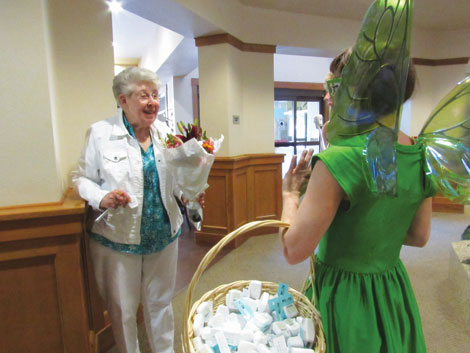Good news: We’re all living longer. According to the U.S. Administration for Community Living, our nation’s demographic profile shows a 24.7 percent increase in people 65 and older. We’re also keeping our teeth longer thanks to advancements in technology, access to care and fluoridated water.
The bad news is that our teeth can require more care as they age with us. Chronic, long-term conditions affecting seniors can require medications that cause dry-mouth. Seniors are also more susceptible to cavities, gum disease and other dental troubles. But all is not lost.
There are a number of ways to enjoy healthier smiles longer:
• Visit the dentist regularly. Your dentist can help keep gum disease and tooth decay in check, and a healthy mouth can help reduce your risk of stroke, heart attack and complications with diabetes.
• Talk to your doctor and pharmacist about dry mouth. Caused by common prescriptions and over-the-counter medications, dry mouth impacts roughly 33 percent of seniors. Negative effects include difficulty swallowing and speaking, irritation of the tongue, increased risk of tooth decay and gum disease.
• Brush two times a day for two minutes and floss nightly. Surprisingly, 47 percent of the over-50 population doesn’t floss daily, even though it helps to clean 40 percent of the surface of your teeth. If mobility in your hands is a challenge, try an electric toothbrush or flossing stick. And finally, limit sugary, between-meal snacks, however tempting, and drink plenty of water. Because Medicare doesn’t cover dental, prevention is especially important.
• Make sure your dentures and partial dentures receive routine cleaning and care. This can prevent infections, not to mention bad breath.
• If transportation is an issue, talk to friends, family and neighbors about getting a lift to your next medical and dental appointments. Your local senior center may also have information about services that can help with this type of transportation need. Don’t forego a visit because you’re afraid to ask for a ride. Your health is worth it.
Start a conversation – with your dentist. Talk to your dentist about your overall health and about any medications you are taking. Your dentist is part of your overall healthcare team. Don’t be afraid to discuss any issues you may be having.
Smile. People who smile are happier, healthier, have less stress and make others around them happier. Share your smile with a loved one or stranger today.
No matter your age, good oral health is important at every stage of life. A recent study found that 34 percent of seniors only brush their teeth once a day. Forgetting this simple but important task can negatively impact oral and overall health. For more information about oral health for older adults, visit www.seniorsoralhealth.org, an educational resource developed by the Washington Dental Service Foundation, which is funded by Delta Dental of Washington.
Dr. Kyle Dosch wrote this article. He

is the dental director at Delta Dental of Washington.